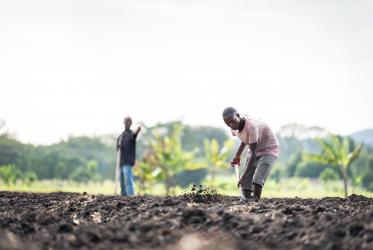It is with deep sorrow that we received the sad news of the death of Carl Friedrich von Weizsäcker, an untiring, credible and enlightened voice for peace, gifted with deep knowledge of science, philosophy and religion.
Carl Friedrich von Weizsäcker gave decisive impetus to the Conciliar Process for Justice, Peace and the Integrity of Creation which brought churches and people together across the divisions of the cold war during the final two decades of the last century. As a nuclear physicist he knew only too well about the potential destruction of nuclear war. Shortly after the end of the Second World War, he recognized his responsibility as a scientist by taking a public stance against nuclear weapons, for example by working on the World Council of Churches' Commission on Christians and the Prevention of War in an Atomic Age in the 1950s. In this work he pointed to the intrinsic link between peace and justice. During the 1970s he built the issue of protecting creation into this schema, with creation as the living foundation for all life.
Weizsäcker's appeal for an ecumenical peace Council at the Düsseldorf Kirchentag in 1985 will always be remembered:
"We call on the churches of the world to convene a Council for peace. Peace is today the pre-requisite for the survival of humanity. This peace is not secure. At an ecumenical Council, convened for the sake of peace, the Christian churches must collectively issue an injunction that humanity cannot ignore. Time is short."
Carl Friedrich von Weizsäcker's appeal was a decisive factor in publicising and gaining support for the Justice, Peace and Integrity of Creation process from the churches. Just a few weeks after his appeal more than 60,000 positive responses had been sent to the headquarters of the German Protestant Kirchentag and there was enormous interest in his book Die Zeit Drängt (Time is Short), which was published afterwards. He was one of the main speakers at the first European Ecumenical Assembly in Basel in 1989 and also took part in the World Convocation on Justice, Peace and the Integrity of Creation in Seoul in 1990.
His commitment to inter-religious dialogue became even more important in recent years. Carl Friedrich von Weizsäcker was certain that the international situation requires common action for survival on our planet.
We give thanks to God for the life and witness of Professor Dr Carl Friedrich von Weizsäcker and send his family our very deepest sympathy.
Rev. Dr Samuel Kobia
General Secretary
World Council of Churches




